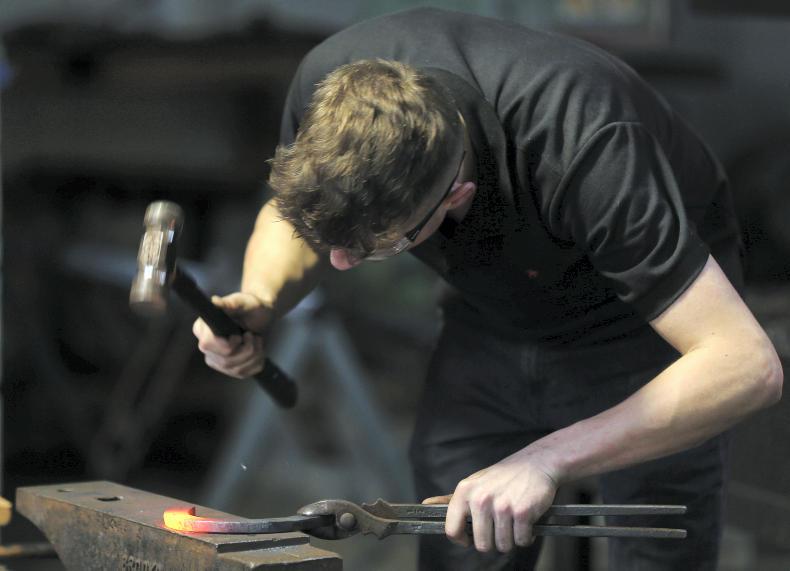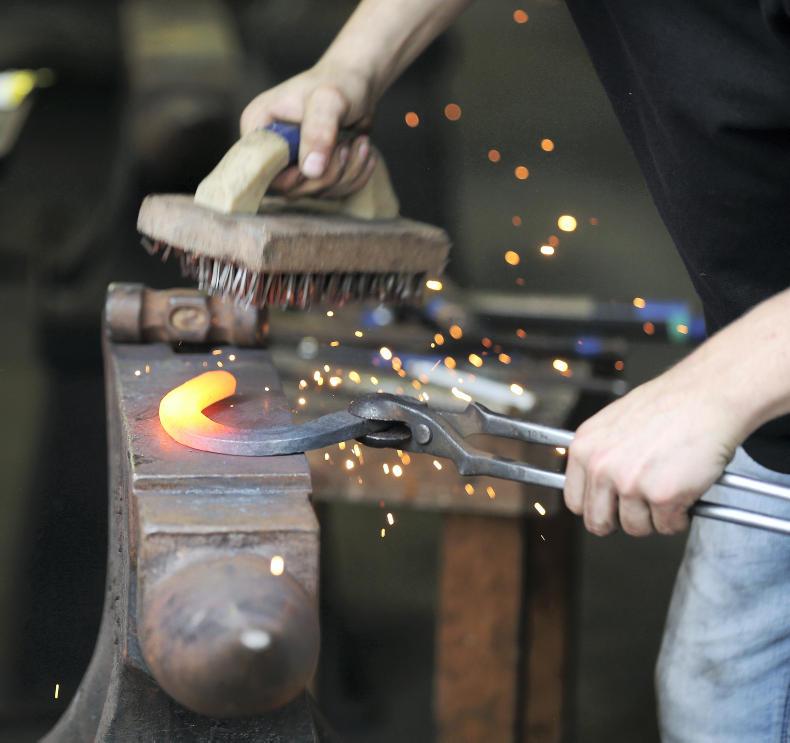At this year’s Agri Careers Fair there will be ample opportunity to learn about apprenticeships. Agricultural machinery companies like CLAAS will be ready and waiting to discuss details of their apprenticeship programmes at the fair while the Apprenticeship Services Stand will be a one-stop shop for everything you need to know about apprenticeships in Ireland.
At the Apprenticeship Services Stand visitors to the fair can learn about two apprenticeships in particular that have an agri twist: agricultural mechanics and farriery.
Agricultural Mechanics
There are currently 150 agricultural mechanic apprentices in Ireland, and they are concerned with fault-finding, repair, overhaul and maintenance of farm tractors and farm machinery.
The skills acquired in this apprenticeship overlap with other motor apprenticeships, so those who successfully complete this apprenticeship are competent to carry out repair work on other machinery, including all-terrain vehicle quads, light and heavy commercial vehicles, earth-moving equipment and forklift trucks.
Farriery
Farriery involves the making and fitting of horseshoes to prepared feet. There are currently 15 apprentice farriers in Ireland.
Those who successfully complete an apprenticeship in farriery will come away with an understanding of different styles of shoeing and trimming and hot and cold shoeing techniques – and this is just to name a few of the niche skills involved in this craft.
Welding to produce and modify tools, and forging tools and shoes are described as vital skills in farriery.
Apprenticeships – the basics
For those interested in completing an apprenticeship, here are some basics you should know:
• You must obtain employment as an apprentice in your chosen occupation with an employer who is approved to train apprentices. • Within two weeks of recruiting you, the employer must register you as an apprentice.• In certain crafts, those applying for an apprenticeship must pass a SOLAS-approved colour vision test. • You must be at least 16 years old. • There are opportunities for advancement after apprenticeships. These include advanced technology courses and management courses, which can be completed in institutes of technology, schools of management and professional institutes. • Many apprentices use their qualification as a springboard to develop their careers and become, for example, an engineer, manager, business owner, teacher or instructor.
At this year’s Agri Careers Fair there will be ample opportunity to learn about apprenticeships. Agricultural machinery companies like CLAAS will be ready and waiting to discuss details of their apprenticeship programmes at the fair while the Apprenticeship Services Stand will be a one-stop shop for everything you need to know about apprenticeships in Ireland.
At the Apprenticeship Services Stand visitors to the fair can learn about two apprenticeships in particular that have an agri twist: agricultural mechanics and farriery.
Agricultural Mechanics
There are currently 150 agricultural mechanic apprentices in Ireland, and they are concerned with fault-finding, repair, overhaul and maintenance of farm tractors and farm machinery.
The skills acquired in this apprenticeship overlap with other motor apprenticeships, so those who successfully complete this apprenticeship are competent to carry out repair work on other machinery, including all-terrain vehicle quads, light and heavy commercial vehicles, earth-moving equipment and forklift trucks.
Farriery
Farriery involves the making and fitting of horseshoes to prepared feet. There are currently 15 apprentice farriers in Ireland.
Those who successfully complete an apprenticeship in farriery will come away with an understanding of different styles of shoeing and trimming and hot and cold shoeing techniques – and this is just to name a few of the niche skills involved in this craft.
Welding to produce and modify tools, and forging tools and shoes are described as vital skills in farriery.
Apprenticeships – the basics
For those interested in completing an apprenticeship, here are some basics you should know:
• You must obtain employment as an apprentice in your chosen occupation with an employer who is approved to train apprentices. • Within two weeks of recruiting you, the employer must register you as an apprentice.• In certain crafts, those applying for an apprenticeship must pass a SOLAS-approved colour vision test. • You must be at least 16 years old. • There are opportunities for advancement after apprenticeships. These include advanced technology courses and management courses, which can be completed in institutes of technology, schools of management and professional institutes. • Many apprentices use their qualification as a springboard to develop their careers and become, for example, an engineer, manager, business owner, teacher or instructor. 





SHARING OPTIONS